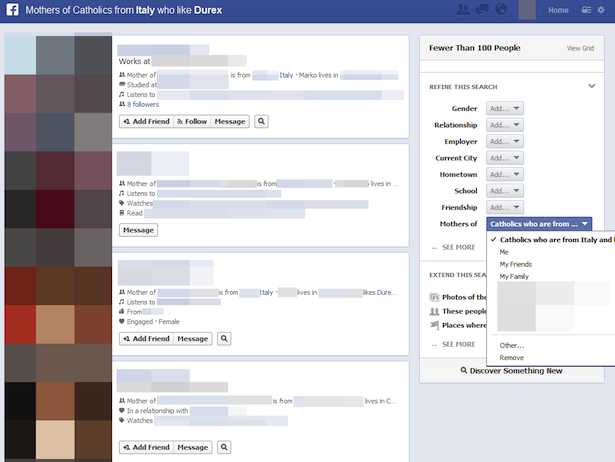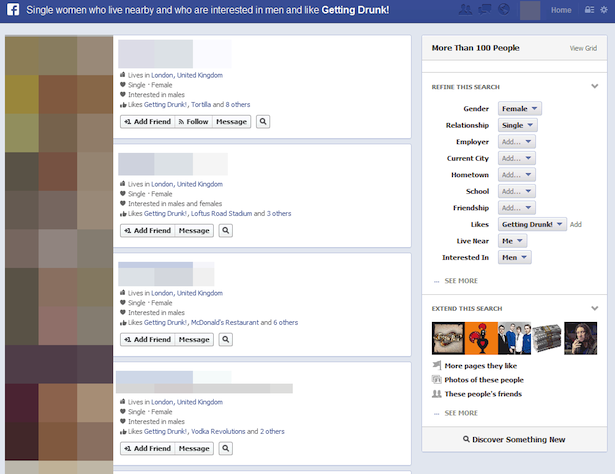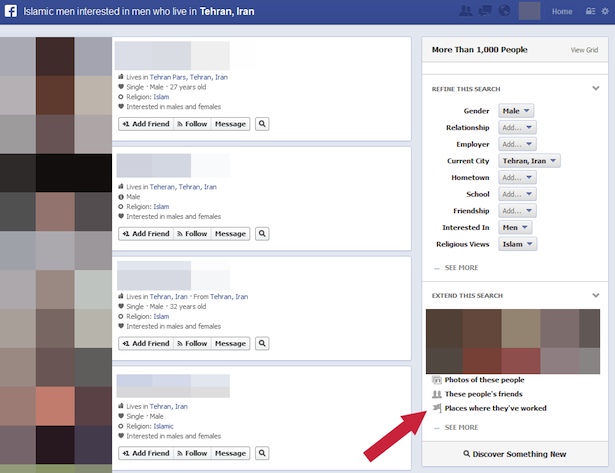The spouses of people who like Prostitutes. The mothers of Jews who like Bacon. Single women who live nearby and like getting Getting Drunk. These people are all on Facebook, and Tom Scott has found them through the service's new Graph Search. And he has compiled them all on, appropriately, a Tumblr: actualfacebookgraphsearches.tumblr.com.
Here's one of his findings:
And here's another:
And here's another:
And here's another:
![[optional image description]](https://webarchive.library.unt.edu/untcsid/20140912025544im_/http://cdn.theatlantic.com/static/mt/assets/science/current-employers-of-people-who-like-racism.png)
So on the one hand: another day, another cheeky single-serve Tumblr. Another day, another warning about the concessions we make to Facebook when it comes to our privacy. "If it'd be awkward if it was put on a screen in Times Square," Scott puts it by way of project summary, "don't put it on Facebook. Oh, and check your privacy settings again."
The Tumblr highlights the danger that, if you are indeed the employer of employees who like racism, you will be called out for this. If you are indeed an employee who likes racism, you will be called out for this. (More urgently, if you are living in a repressive regime and have identified yourself as a "man who likes men," you will be called out for this.)
But ActualFacebookSearches highlights another danger, too -- less immediate, but there nonetheless as a harbinger of the way we will relate to and understand each other in a data-driven world: Facebook categorizes us. Or, rather, we categorize ourselves through the mechanism of Facebook. And Graph Search means that people outside of Facebook can re-categorize us according to agendas that have much less to do with "connecting the world" and much more to do with stratifying it.
So if I'm married to a guy who likes prostitutes, that is no longer just a circumstance. That is a category, with all the freight of implication that comes with it. Categories extrapolate. Categories separate. My marital status, and the context of it, and the happiness or sadness of it, may still be an intimate, nuanced, messy thing, a thing so intimate and nuanced and messy that it can be called a fact only in the strictest sense. Under Facebook's auspices, however, that feature of my life is stripped down and cross-referenced and otherwise transformed into a unit of actionable information -- for Facebook, and, as Scott makes clear, for anyone else who makes it their business to benefit from the systematic categorization of society.
It is both funny and ridiculous that we can now find, on Facebook, the population of people who currently work at Tesco and like horses. But it's also a reminder that Facebook is changing how we think of "populations" in the first place: not just as people who share circumstances, but as data points that share statistics.

































 In Focus
In Focus
Join the Discussion
After you comment, click Post. If you’re not already logged in you will be asked to log in or register. blog comments powered by Disqus